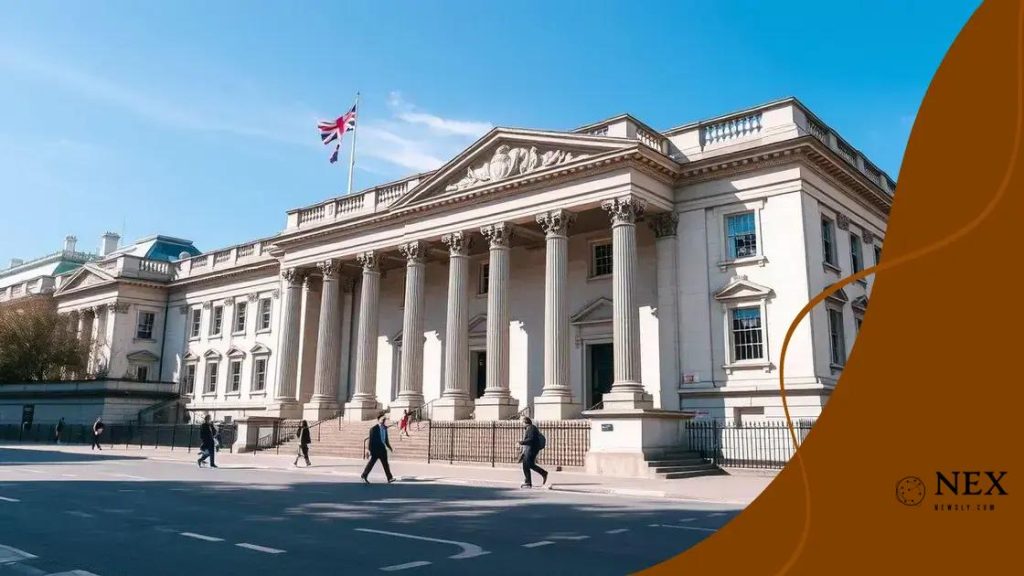Bank of England forecast: what to expect in the coming months

Anúncios
The Bank of England forecast plays a critical role in shaping economic conditions, influencing inflation, interest rates, and providing essential insights for individuals and businesses to navigate financial decisions.
Bank of England forecast reveals significant insights into the UK economy’s future. Have you ever wondered how these predictions impact your financial decisions? Let’s dive in and explore the details!
Anúncios
Overview of the Bank of England’s role
The Bank of England plays a crucial role in the UK’s economy. Understanding its functions helps us grasp how monetary policy affects our daily lives and the economy as a whole.
One of the primary responsibilities of the Bank is to maintain monetary stability. This involves controlling inflation and ensuring that prices remain stable. The Bank’s Monetary Policy Committee meets regularly to review economic conditions and set interest rates accordingly.
Functions of the Bank of England
Besides regulating interest rates, the Bank of England has several key functions:
Anúncios
- Issuing banknotes to ensure the availability of currency.
- Overseeing the stability of the banking system to protect depositors.
- Providing economic forecasts to inform government policies.
Furthermore, the Bank works closely with the UK government. It advises on economic matters and plays a vital role in implementing financial regulations. By doing so, the Bank of England helps create a secure financial environment that benefits everyone.
The Bank also acts as a lender of last resort. This means it provides funding to financial institutions facing liquidity problems. This function is essential in times of economic distress, helping to prevent wider financial crises.
Impact on Daily Life
The decisions made by the Bank of England can have a direct impact on our lives. Changes in interest rates affect borrowing costs for mortgages and loans. A lower interest rate can encourage spending and investment, which can boost economic growth. On the other hand, higher rates can slow down spending, helping to control inflation.
Keeping track of the Bank’s policies and forecasts allows individuals and businesses to make informed financial decisions. Awareness of Bank of England trends helps us understand shifts in the economy and prepare for changes in our financial environments.
Key factors influencing the forecast
The Bank of England’s forecast is influenced by various factors that reflect the current economic environment. Understanding these key factors is essential for interpreting the Bank’s predictions and their impact on the economy.
One major factor is inflation, which is the rate at which prices for goods and services rise. High inflation can lead the Bank to increase interest rates to stabilize the economy. Conversely, low inflation may prompt the Bank to lower rates to encourage spending.
Major Influences on the Prediction
Several key elements shape the Bank’s outlook:
- Consumer Spending: When consumers buy more, it boosts economic growth, which can influence the forecast.
- Global Economic Trends: Changes in international markets can affect the UK’s economy, impacting the Bank’s predictions.
- Employment Rates: Higher employment typically leads to increased spending, which can positively affect the forecast.
- Government Policy: Fiscal policies, such as taxes and government spending, play a crucial role in shaping economic conditions.
In addition to these factors, the economic data released by various agencies provides insights into trends. Reports on GDP growth, manufacturing, and trade balance are vital for understanding where the economy is heading. These indicators inform the Bank’s decisions and forecasts.
The Bank also considers uncertainties in the economy, such as political events or global crises. These uncertainties can significantly impact economic stability and influence the forecast. For instance, unexpected changes in international trade agreements can create ripples in the economy.
The Role of Technology
Technology advancements can also impact economic forecasts. Innovations can lead to increased productivity and changing consumer behavior, which in turn affects spending patterns. The Bank must adapt its forecast based on these technological shifts.
Overall, the Bank of England’s forecasting relies on a combination of these factors. By analyzing current trends and potential future scenarios, the Bank aims to provide a reliable outlook for the economy. Staying informed about these influences allows individuals and businesses to navigate financial decisions more effectively.
Implications for businesses and consumers

The Bank of England’s forecast impacts both businesses and consumers in various ways. Understanding these implications is crucial for navigating the economic landscape.
For businesses, the forecast affects planning and investment decisions. Changes in interest rates can impact borrowing costs. Higher rates may lead to increased costs for loans, which businesses might pass on to consumers in the form of higher prices. This scenario can influence revenue projections and overall business strategy.
Key Implications for Businesses
Businesses should consider several important factors:
- Cost of Borrowing: Increased interest rates raise the cost of loans, making operations more expensive.
- Consumer Spending: If consumers face higher prices due to economic changes, their spending may decrease, impacting sales.
- Investment Decisions: Uncertain forecasts may cause businesses to delay expansion plans until more stable conditions arise.
On the consumer side, the implications are equally significant. Changes in the forecast can influence consumer confidence. For instance, if inflation is projected to rise, consumers may choose to save rather than spend. This change can slow down the economy, creating a ripple effect on businesses.
Impact on Consumers
Key factors affecting consumers include:
- Inflation: Rising prices can erode purchasing power, making it more challenging for families to afford essentials.
- Interest Rates: Increased rates can lead to higher monthly payments on loans and mortgages, affecting household budgets.
- Job Security: If businesses predict tough times, they may hold back on hiring, impacting consumer confidence.
In response to these implications, both businesses and consumers need to adapt. Businesses can explore alternatives for funding, like seeking investment or cutting costs. Consumers should create budgets that account for potential changes in income and expenses. Keeping a close watch on economic forecasts helps both parties make informed decisions.
Ultimately, being aware of the Bank of England’s predictions enables better financial planning and decision-making for both businesses and individuals. It encourages a proactive approach to potential economic changes, ensuring readiness for whatever lies ahead.
Predictions for inflation and interest rates
The Bank of England’s forecast includes important predictions about inflation and interest rates that greatly affect the economy. Understanding these predictions can help businesses and consumers prepare for future financial changes.
Inflation refers to the rate at which prices for goods and services rise. When inflation increases, it means that money doesn’t go as far as it used to. This phenomenon can lead to various economic challenges. The Bank of England closely monitors inflation rates to make necessary adjustments to their policies.
Inflation Predictions
Several factors influence the Bank’s inflation predictions:
- Consumer Demand: High demand for goods can lead to price increases.
- Supply Chain Issues: Disruptions in supply chains can limit product availability, driving prices up.
- Global Economic Trends: Changes in the global economy can affect domestic inflation.
As inflation rises, the Bank of England might raise interest rates. Higher interest rates can help control inflation by making borrowing more expensive, which, in turn, slows down spending.
Interest Rate Forecasts
Interest rates are another key aspect of the Bank’s predictions. It’s important to consider how changes in interest rates can impact various financial areas:
- Mortgage Payments: Higher interest rates can lead to increased monthly payments for home loans.
- Business Loans: Companies may face higher costs when borrowing money, potentially slowing down growth.
- Consumer Spending: As borrowing becomes more expensive, consumer spending might decrease, affecting economic growth.
The Bank’s interest rate decisions are based on a combination of current economic conditions and inflation forecasts. By keeping interest rates in check, the Bank aims to create a stable economic environment.
Overall, the predictions for inflation and interest rates play a crucial role in shaping the economic landscape. Staying informed about these forecasts can help individuals, businesses, and investors make better financial decisions.
Advice for navigating economic changes
Navigating economic changes can be challenging for both individuals and businesses. Having a clear strategy can help in dealing with the uncertainties that arise from shifts in the economy. Understanding how to respond can lead to better outcomes.
One important strategy is to stay informed about the Bank of England’s forecasts and economic trends. Regularly checking financial news and reports can aid in understanding potential impacts. This knowledge can help you make informed decisions whether you are budgeting for personal finances or planning business investments.
Key Strategies for Individuals
Individuals should consider several practical steps:
- Create a Budget: Keeping a detailed budget can help you track expenses and savings, making adjustments easier during economic fluctuations.
- Build an Emergency Fund: Having savings set aside for unexpected events, like job loss or urgent expenses, can provide a safety net.
- Invest Wisely: Diversifying investments can help stabilize finances against economic downturns.
For example, if inflation is rising, individuals may want to reconsider their spending habits. They could prioritize essential items and delay larger purchases until economic conditions improve.
Strategies for Businesses
Businesses can also take proactive measures:
- Monitor Financial Health: Regularly reviewing financial statements can help identify issues early on.
- Adapt to Changing Markets: Flexibility in business strategies can be crucial. Being ready to pivot based on new data can lead to missed opportunities.
- Enhance Customer Engagement: Keeping close contact with customers can help understand their needs and adjust products or services accordingly.
Businesses that actively engage with their customers can adapt to shifting demands and maintain sales. This strategy allows them to stay competitive even during economic changes.
Overall, the key to successfully navigating economic changes lies in preparation and adaptability. Whether as an individual or a business owner, being proactive can make a significant difference in managing financial challenges.
FAQ – Frequently Asked Questions about Economic Forecasts
What is the role of the Bank of England in the economy?
The Bank of England manages monetary policy, controls inflation, and provides financial stability for the UK economy.
How can inflation impact my financial decisions?
Higher inflation can decrease purchasing power, leading you to adjust your spending and savings strategies.
What should businesses do to prepare for economic changes?
Businesses should monitor economic indicators, adjust budgets, and remain flexible to adapt to shifts in the market.
How can individuals navigate changing interest rates?
Individuals can benefit by budgeting wisely, understanding loan terms, and exploring savings options to mitigate the effects of interest rate changes.





